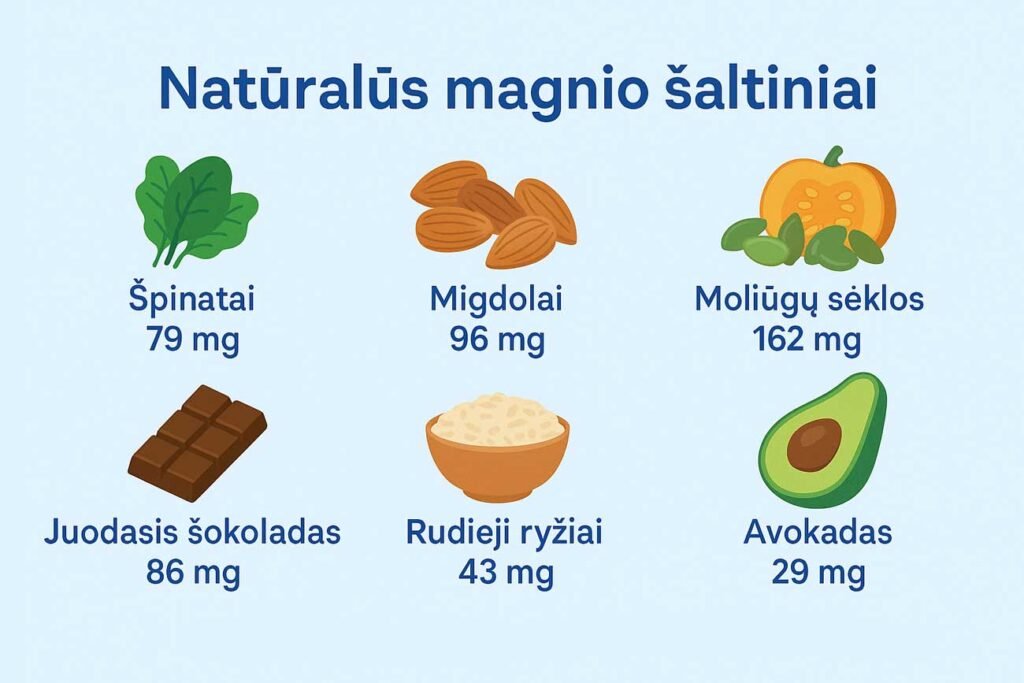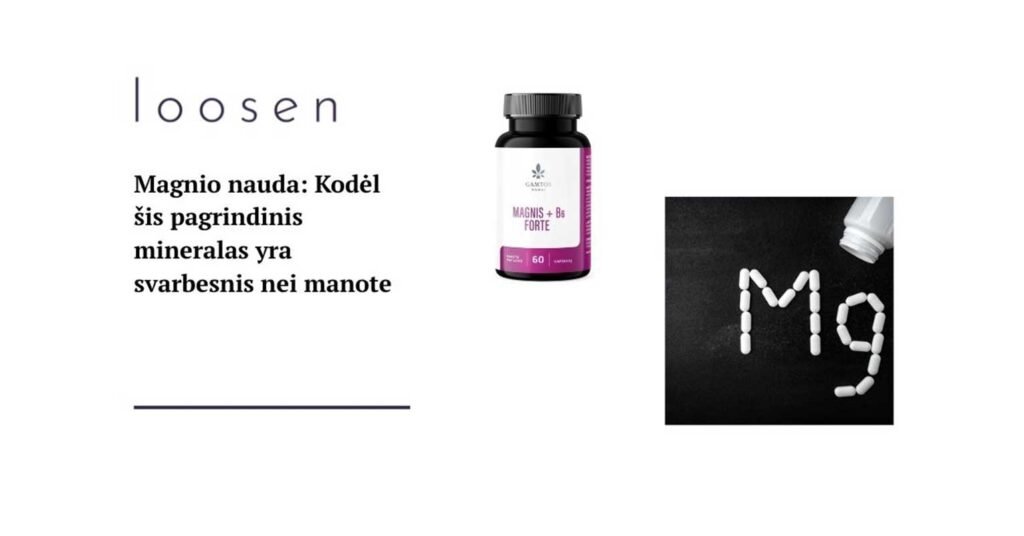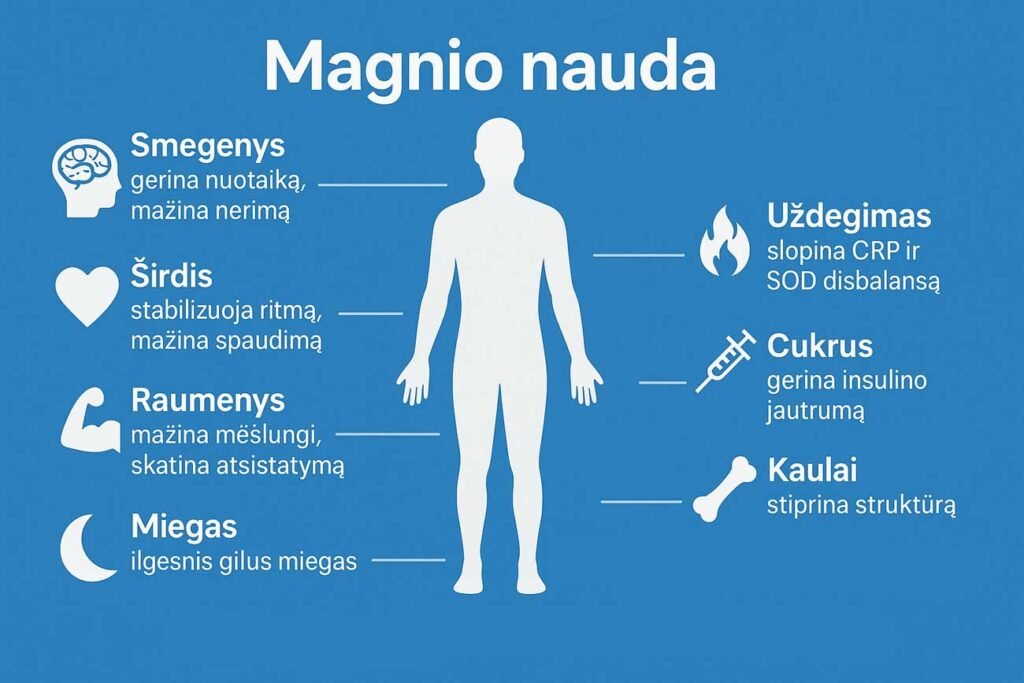Magnesium is involved in over 300 enzymatic reactions, supports nerve function, muscle contraction, glucose regulation, bone structure, DNA synthesis, energy production, and the cardiovascular system.
About 50% of the population is deficient in magnesium, which is associated with inflammation, heart disease, and an increased risk of chronic diseases. This article discusses the importance of magnesium, the most common causes of deficiency, food sources, supplement forms, and their effects.
In short: what you need to know about the benefits of magnesium
- Activates over 300 enzymatic reactions, supports energy production, and DNA synthesis
- Stabilizes heart rate, lowers blood pressure, and reduces inflammation
- Improves cognitive function, mood, and may help with anxiety or depression
- Promotes muscle recovery, reduces cramps, and markers of muscle damage
- The forms used – magnesium glycinate, citrate, and oxide – have different effects on sleep, digestion, and pain relief
What is magnesium and why is it necessary for the body
Magnesium is involved in more than 300 enzymatic reactions: it supports energy production (Mg-ATP), DNA and RNA synthesis, muscle contraction and nerve impulse transmission.
It is the eleventh most abundant element in the human body, acting mainly as the Mg²⁺ ion – an essential cofactor for cellular metabolism in all tissues.
Magnesium is essential for muscle function, glucose control, blood pressure regulation and bone structure.
Its natural sources are green leafy vegetables, nuts, seeds and whole grains.
The recommended daily dose of magnesium supplements is 300-400 mg, but the exact dose depends on the individual’s physiology. Before taking supplements, it is necessary to consult a doctor. To ensure better absorption and avoid digestive disorders, supplements should be taken with water.
Key Evidence-Based Magnesium Benefits
Magnesium supports cardiovascular function, the nervous system, muscle strength, sleep, and gastrointestinal motility, all of which have been clinically proven.
Its effects include lowering blood pressure, improving cognitive function, preventing cramps, promoting deep sleep, and improving digestive function.
Magnesium supports heart health and regulates blood pressure
Magnesium supports heart function by dilating blood vessels (vasodilation), stabilizing heart rhythm (antiarrhythmic properties) and lowering blood pressure (antihypertensive effect).
It promotes the production of nitric oxide and endothelial relaxation, which reduces systemic vascular resistance.
Magnesium stabilizes electrical conduction in the heart and reduces the risk of ventricular arrhythmias. At the same time, it inhibits the activity of C-reactive protein (CRP) and oxidative stress markers associated with atherosclerosis.
These processes help reduce the risk of stroke and ischemic heart disease. Dosage depends on individual needs, so it is necessary to consult a doctor before taking supplements. Drink enough water – this is important for overall cardiovascular health.
Magnesium enhances cognitive function and improves mood
Magnesium supports brain function by protecting synapses, activating NMDA receptors, and strengthening the blood-brain barrier.
Optimal serum magnesium levels (1.12-1.24 mmol/L) are associated with improved cognitive performance and increased gray matter volume in the hippocampus.
This mineral reduces neuroinflammation, inhibits stress hormones, increases BDNF expression, and may affect substance P—all of which contribute to emotional balance.
The greatest effect is achieved by maintaining optimal magnesium levels in the body. The dosage should be individually adjusted – consult a doctor before use.
Magnesium promotes muscle function and reduces cramps
Magnesium supports muscle function, reduces cramps, accelerates recovery and protects against inflammation after exercise.
It stabilizes calcium channels, regulates neuromuscular transmission and maintains electrolyte balance. These mechanisms are important for athletes and people experiencing muscle discomfort.
Key benefits:
- Reduces nighttime leg cramps
- Accelerates recovery from exercise
- Reduces creatine kinase and lactate dehydrogenase (markers of muscle damage)
- Protects against exercise-induced inflammation and oxidative stress
Effective daily dose – about 400 mg of bioavailable form.
Magnesium improves sleep quality and helps overcome insomnia
Magnesium can improve sleep efficiency, increase the duration of deep sleep and reduce the number of awakenings during the night.
Clinical studies show that 1000 mg of magnesium per day can improve sleep indicators: increased sleep duration, reduced awakenings, improved heart rate variability – a marker of restorative sleep.
The benefits are strongest in people with mild symptoms of insomnia.
Magnesium is involved in the synthesis of GABA and serotonin – these neurotransmitters regulate sleep-wake cycles.
Magnesium improves digestion and relieves constipation
Magnesium acts as an osmotic laxative and muscle relaxant, therefore facilitating intestinal motility and stool elimination.
Mechanisms of action:
- Stimulates intestinal motility by regulating nerve and muscle signals
- Increases water content in the intestine, thereby softening stools
- Reduces spasms by inhibiting acetylcholine activity
- Maintains electrolyte balance necessary for digestive function
Standard therapeutic dose is 200-400 mg per day, the effect occurs within 6-24 hours. The supplement can also relax smooth muscle tissue via beta-adrenergic pathways.
Magnesium regulates blood sugar levels and supports metabolism
Magnesium improves insulin sensitivity, reduces HbA1c and helps maintain stable blood glucose levels, especially in type 2 diabetes.
Supplementation doses of 250-400 mg per day may improve glucose control, especially in individuals with low magnesium levels, Asian populations and those with recent diabetes.
Main modes of action:
- Promotes glucokinase activity
- Protects beta cells from damage
- Reduces systemic inflammation
A high magnesium intake, especially in combination with fiber, may reduce the risk of type 2 diabetes. This is a cost-effective way to maintain metabolic health.
Magnesium reduces inflammation and oxidative stress
- Magnesium inhibits inflammatory processes by reducing C-reactive protein (CRP), stabilizing superoxide dismutase (SOD), inhibiting the RAAS system and modulating NMDA receptors.
- Mechanisms of action:
- Reduces CRP – a key marker of systemic inflammation
- Enhances cellular defenses through SOD stabilization
- Inhibits RAAS activity and protects the endothelium from oxidative stress
- Modulates NMDA receptors and reduces neuroinflammation
These processes help maintain mitochondrial function, antioxidant defense, and vascular homeostasis. Magnesium is an important component of comprehensive anti-inflammatory strategies.
Magnesium helps reduce migraine attacks
Magnesium reduces the frequency and intensity of migraines by affecting neural and vascular mechanisms.
About 45% of women with menstrual migraines are deficient in ionized magnesium during migraine.
Effective forms:
- Intravenous magnesium – provides relief within 15-45 minutes
- Oral magnesium citrate – 600 mg per day – effective for prevention
Magnesium inhibits cortical spread inhibition, reduces neurotransmitter release, and improves blood flow in the temporal and frontal areas of the brain.
It also reduces neuronal excitability and platelet aggregation.
Magnesium strengthens bones and helps protect against osteoporosis
Magnesium increases bone mineral content and promotes osteogenesis. 300 mg of magnesium per day can increase hip bone density in magnesium-deficient adolescents and activate alkaline phosphatase, an enzyme necessary for bone formation.
Its effect depends on the concentration: both deficiency and excess can weaken skeletal integrity. Higher doses can inhibit late bone mineralization and affect bones unevenly – differently in weight-bearing and non-weight-bearing bones.
To ensure effective results and avoid calcium-phosphate imbalance, accurate dosing is necessary.
Magnesium reduces anxiety and maintains mental balance
Magnesium regulates the hypothalamic-pituitary-adrenal (HPA) axis, reduces cortisol levels and helps restore normal stress responses.
300 mg of magnesium per day, especially in combination with vitamin B6, can significantly improve anxiety. The mineral acts on inhibitory neurotransmitters and stops excessive neuronal activity, thereby stabilizing emotional management.
This dual effect helps restore mental balance after stress. The dosage must be individually selected. Regular water consumption is necessary for better magnesium absorption and overall nervous system function.
Magnesium reduces PMS symptoms and maintains hormonal balance
Magnesium reduces the symptoms of premenstrual syndrome (PMS) and regulates hormonal activity through several biochemical mechanisms.
Main effects:
- Reduces uterine spasms by regulating muscle contraction cycles and reducing prostaglandin levels
- Stabilizes hormonal activity through the hypothalamic-pituitary-adrenal (HPA) axis
- Activates the synthesis of GABA neurotransmitters and serotonin (especially in combination with vitamin B6)
- Inhibits inflammatory markers associated with menstrual pain
Effective forms of magnesium – citrate, glycinate, malate – are characterized by higher bioavailability. The dose ranges from 150 to 300 mg per day and should be selected individually.
Signs of Magnesium Deficiency: How to Recognize the Early Signs
Magnesium deficiency is manifested by muscle, nerve, and heart problems. The most common symptoms are:
- muscle cramps, twitching, or weakness
- numbness, personality changes, seizures
- hypertension, heart rhythm disturbances
- loss of appetite, nausea, vomiting
- cnfusion, difficulty breathing
Symptoms usually begin in the musculoskeletal system and can progress if the deficiency is not corrected. Severe cases require immediate medical evaluation.

Magnesium sources in food: what to choose in your daily diet
Foods rich in this mineral help to ensure your daily magnesium needs:
- Nuts: almonds (96 mg/100 g), cashews, walnuts
- Seeds: pumpkin seeds (162 mg/100 g), sunflower
- Legumes: black beans (83 mg/100 g), kidney beans (96 mg/100 g), adzuki beans (63 mg/100 g)
- Grains: quinoa, whole wheat, brown rice
- Vegetables and fruits: spinach, avocados, dried figs
- Snacks: dark chocolate (23 mg/28 g), nut mixes, peanut butter
Mineral water can also replenish magnesium reserves if it is naturally rich in this element.
Are Magnesium Supplements Worth Taking? Here’s Who They May Benefit
Magnesium supplements may be beneficial for people who are deficient in this mineral due to diet, age, lifestyle, or health conditions. They may be particularly beneficial for:
- people over 50
- those with diabetes
- those experiencing chronic stress or insomnia
- those consuming a lot of caffeine or alcohol
- those who are active athletes
The form of the supplement matters. Glycinate and citrate are better absorbed than the oxide. Athletes may benefit from taking magnesium before or after exercise to help with muscle recovery.
However, high doses can cause diarrhea or interact with some medications, especially antibiotics and diuretics.
Pros and Cons of Different Magnesium Forms
Magnesium Forms: When to Choose Glycinate, Citrate or Oxide?
Each form of magnesium has different effects, so it is important to choose the one that meets your body’s needs:
- Magnesium glycinate – suitable for people experiencing anxiety, insomnia or muscle fatigue. Well absorbed, gentle on digestion.
- Magnesium citrate – useful for those suffering from constipation, digestive disorders or sugar metabolism problems. Has a mild laxative effect.
- Magnesium oxide – suitable for heartburn, migraines or temporary magnesium deficiency. Although less absorbed, it contains a lot of elemental magnesium.
Pregnant women, the elderly, people with osteoporosis or heart disease may have a higher need for magnesium. The recommended daily allowance is 310-420 mg, but the dosage is best determined individually, after consulting a doctor.
Magnesium Benefits: FAQ
Can Magnesium Supplements Help Sleep Apnea?
Magnesium supplements may help improve sleep quality in people with sleep apnea, but scientific evidence is limited. Magnesium deficiency is associated with an increased risk of sleep apnea, and supplementing may have positive effects on sleep parameters such as deep sleep and blood oxygen levels. However, magnesium is not considered a direct treatment for sleep apnea.
How Does Magnesium Interact with Prescription Medications?
Magnesium may interact with some prescription medications, particularly by affecting their absorption. It may reduce the effectiveness of antibiotics such as tetracyclines and fluoroquinolones, and bisphosphonates (used to treat osteoporosis). When taken with calcium channel blockers, magnesium supplements may enhance their effects on blood pressure. They may also help prevent diuretic-induced hypomagnesemia
Can too much magnesium be dangerous?
Yes, too much magnesium can be toxic and dangerous to your health. Magnesium overdose can cause diarrhea, muscle weakness, drowsiness, low blood pressure, and in severe cases, respiratory depression or organ failure. The risk is especially high in people with kidney problems.
Is magnesium absorbed through the skin from Epsom salt baths?
Magnesium may be absorbed through the skin from Epsom salt (magnesium sulfate) baths, but scientific evidence is limited. Some studies have found increased levels of magnesium in the blood or urine after baths, but the clinical significance of these changes remains unclear. Absorption may be affected by water temperature, bath duration, salt concentration, and skin condition. Such baths can be helpful for relaxation, but they cannot replace magnesium intake through diet or supplements.
How quickly can magnesium supplements relieve muscle cramps?
Magnesium supplements can start working within 1-4 hours, but it may take 3-4 weeks to achieve long-term effects. Regular use can reduce the frequency and duration of cramps, especially if the cause is an electrolyte imbalance or magnesium deficiency. Magnesium helps relax muscles and regulates the transmission of nerve impulses. Drinking more water can increase the effectiveness of supplements. The most suitable forms for rapid absorption are magnesium citrate, glycinate or malate.



